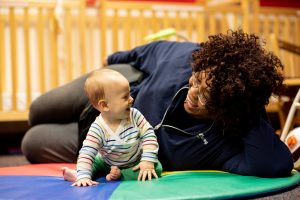We look forward to so many of baby’s firsts, but there are some firsts that aren’t so fun. It’s bound to happen at some point: Your baby isn’t acting like himself and you notice he’s warm.
It’s hard not to panic, but knowing in advance what a fever really is and how you can help keep your little one safe and comfortable will be helpful when that first fever strikes.
What is a fever exactly?
A fever means your body is heating up to a higher body temperature than normal. Our amazing bodies know what to do when an infection invades: The body temperature rises to kill the bacteria or virus. This means fevers are not necessarily a cause for panic. Know that your child’s body is responding and working to kill off what is making her sick. Fevers in young infants, however, warrant close monitoring and attention, so in certain circumstances, it’s important to contact your pediatrician, especially if your baby is younger than three months.
Which thermometer is best?
If you’ve strolled your pharmacy’s thermometer aisle, you know there are many options for taking your baby’s temperature. Methods range from orally, rectally, axillary (under the arm), tympanic (in the ear), and temporally (across the forehead). Each has its advantages and disadvantages. For infants younger than twenty-four months, a reliable digital thermometer is best. You can start by checking the baby’s temperature under the arm. If it is higher than 99.0 degrees, you will want to get a rectal temperature to confirm a fever (higher than 100.4 for an infant younger than twenty-four months).
A temporal thermometer is useful when you don’t want to wake your sleeping infant. Again, if the reading is greater than 99.0, you should confirm a fever with a rectal digital thermometer. Ear thermometers should not be used in infants less than twenty-four months because their ear canals are not large enough to make good tympanic contact and ensure an accurate reading.
When does a fever warrant a call to the doctor?
For infants younger than three months, fevers are of greater concern. You should call your pediatrician right away if your infant’s temperature is greater than 100.4 rectally.
For infants three to twenty-four months, you should call your pediatrician if the fever is 102 degrees or higher (when taken rectally), or if your baby’s fever is over 100.4 and he appears to be uncomfortable, lethargic, not drinking well, or not wetting his diapers. You should also call your pediatrician if your baby’s fever persists for more than a day or two.
How can I help my baby when she has a fever?
When your baby has a fever, you can help her stay comfortable by trying to bring her body temperature down slowly. A great way to do this is to place your baby skin to skin with you, covered by a thin blanket. A parent’s body temperature will adjust to cool baby slowly. You can also give your baby a lukewarm bath (not too cold!) and dress her in breathable, light clothing. Medications like acetaminophen and ibuprofen will bring fevers down, as long as your pediatrician gives approval to use them. For infants under twenty-four months, be sure to get the proper dose for your baby’s weight from your pediatrician. Once you are sure of the recommended dosage, use a dosing syringe designed for babies or the device or syringe that comes with the medication.
First fevers can be scary for new parents, as well as veterans. You should know that most infections and viruses that cause fever are mild and will resolve within a few days. When in doubt, it never hurts to consult your pediatrician. They’re used to it.

